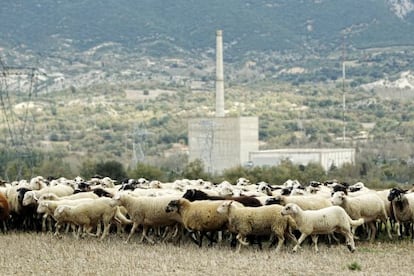Energy reforms leave Garoña investment up in the air
New taxes on atomic energy threaten the extension of the plant’s life

The government’s plans to reform the energy sector look set to clash with its commitment to extend the life of the Garoña nuclear plant, located close to the city of Burgos. The operation of the power station until 2019 would require an investment of around 100 million euros, according to the Nuclear Security Council (CSN).
This month, Industry Minister José Manuel Soria approved a five-year extension of the plant, saying: “We cannot allow ourselves to under-utilise any of our energy resources,” adding that “we need a good mix, a good combination of power sources.”
The previous ruling that Garoña could operate only until July 2013 came in contrast to the CSN’s opinion at the time, which specified clearly that the plant was suitable to operate for at least 10 years after 2009, given certain engineering improvements. The selection of a short license was made in 2009 by the previous government of José Luis Rodríguez Zapatero, which until February 2011 adhered to the concept of 40 years as a reference lifespan for a nuclear reactor.
Having generated its first power in 1966, Garoña is the oldest of Spain’s nuclear power plants. It is a 466 MWe boiling-water reactor, which has produced over 131 billion kWh to date.
The plant is owned in equal parts by power companies Iberdrola and Endesa via their joint venture Nuclenor.
Environmental group Greenpeace has pressed for its closure, portraying it as a “twin sister” of the Fukushima plant in Japan, which was hit by an earthquake and tsunami in March 2011, causing reactor meltdowns.
One of Spain’s main environmental groups, Ecologists in Action, says that “maintaining an old plant that was built before conclusions were drawn from the worst nuclear accidents [...] and which suffers from unsolved problems, is irresponsible.”
Spain’s dependence on imported energy means that supplies must be diversified to use all available sources, says the government. Soria said in July that “nuclear energy contributes significantly to diversification.”
Furthermore, the plant is a significant factor in the economy of the northern Burgos region, where trade association Foro Nuclear says it directly supports 1,500 families and contributes about 355 million euros a year through procurement, contracting, employment and taxes. The government says this economic factor “deserves special consideration, given the current economic climate.”
Foro Nuclear president María Teresa Domínguez said the decision was the right one, because it was based on rational arguments and was consistent with the government’s overall energy policy.
Spain is home to six nuclear power stations, which include eight reactors. Lawmakers agreed in February to extend the pre-established lifespan of 40 years for the facilities.
Reform of the energy sector will be delayed until September as more cuts to premiums on renewables are being studied as a partial alternative to disputed tax proposals on power firms, government sources say.
The Industry Ministry says that it wants the production of nuclear, hydroelectric and thermoelectric energy to be charged at 4 percent, or 2 euros per megawatt billed to consumers.
Some other forms of energy would be charged at higher rates, including wind energy at 11 percent to raise 440 million euros and photovoltaic energy at 19 percent to generate 550 million euros.
On top of this first tax, nuclear and hydroelectric plants would pay an additional tax of 10 euros per megawatt and 15 euros per megawatt respectively, while hydrocarbons would face an additional surcharge of 4 cents a cubic meter, which is expected to raise 1.2 billion euros.
Other cuts to the sector include slashing 50 million euros for energy transportation and 100 million euros for services outside the mainland.
The reforms come at a critical moment as Spain battles to raise tax revenues and avoid a full sovereign bailout. Madrid has said that about 8.6 billion euros of a 65-billion-euro austerity program will come from new energy and environmental taxes in the next two-and-a-half years.
The government has increased electricity prices twice this year and is now looking to spread its austerity program to cover more industries.
For years Spanish utilities have charged customers less than the cost of producing energy, creating a 24-billion-euro tariff deficit the government has absorbed, and which it now hopes to slash through taxes on the industry.
Soria has been promising reform since taking office. But the draft bill has been caught up in government wrangling over both the legality and the use of taxes on power generation. A failure to implement the reform would force the government to revise once again its budget plans in order to find alternative sources of revenues.
Soria is also under pressure from the judiciary after the Supreme Court ruled that the tariff deficit — estimated to rise by 4 billion euros a year if no action is taken — must be eliminated in 2013.
Tu suscripción se está usando en otro dispositivo
¿Quieres añadir otro usuario a tu suscripción?
Si continúas leyendo en este dispositivo, no se podrá leer en el otro.
FlechaTu suscripción se está usando en otro dispositivo y solo puedes acceder a EL PAÍS desde un dispositivo a la vez.
Si quieres compartir tu cuenta, cambia tu suscripción a la modalidad Premium, así podrás añadir otro usuario. Cada uno accederá con su propia cuenta de email, lo que os permitirá personalizar vuestra experiencia en EL PAÍS.
¿Tienes una suscripción de empresa? Accede aquí para contratar más cuentas.
En el caso de no saber quién está usando tu cuenta, te recomendamos cambiar tu contraseña aquí.
Si decides continuar compartiendo tu cuenta, este mensaje se mostrará en tu dispositivo y en el de la otra persona que está usando tu cuenta de forma indefinida, afectando a tu experiencia de lectura. Puedes consultar aquí los términos y condiciones de la suscripción digital.








































